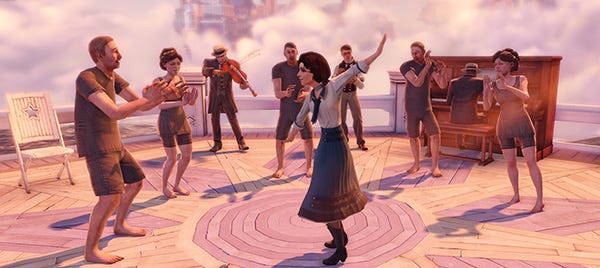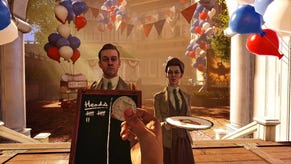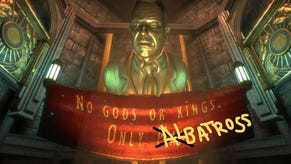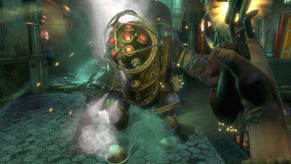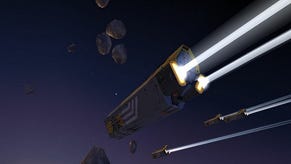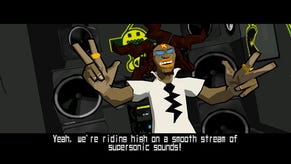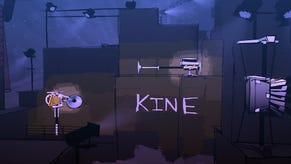Ten Intrigues I Didn't Mention About BioShock Infinite
Another World
4500 words, and I still feel I didn't get anywhere near close to covering everthing I wanted to about BioShock: Infinite - that I made lengthy generalisations but not enough specification of the smaller, or at least subtler, details and events of a game which consistently barrages the player with imagery and ideas. Here are a few I missed, just to get them off my chest. Could maybe, possibly be said to contain some minor spoilers, depending on how absolute you are about these sorts of things.
- Standing still, listening to complete renditions of songs from the late twentieth century, performed in an early twentieth century style. God Only Knows, Girls Just Wanna Have Fun, Tainted Love - all appearing unexpectedly, and sounding exactly like songs of 1912. It always takes a moment to realise that I'm listening to something that shouldn't exist - the music of tomorrow, today. Infinite's soundtrack is a wonderful one, but it goes beyond Rapture's period scene-setting by also adding to the overall air of distorted reality in Columbia.
- The option to watch flickering black and white, low frame rate cine film recordings of moments in Columbia's history - part propaganda, part some unseen fellow's early, amateurish experimentation with cinematography.
- The moment with the baseball - a moment of acute, overwhelming horror as the NPCs around you treat it as one of of joy. What manner of person does what they ask? I couldn't bring myself to, but I think I need to go back and do so in order to see (and feel) the consequences of it.
- The beach early in the game, a moment of pure calm right after one of pure destruction, and now much I wanted to be there myself - the perfect picture it painted of harmony, of how Columbia could have been a paradise if only it didn't have this dark, racist heart underneath its shining skin.
- The interplay between the Lutece twins, the pair of amiably caustic British scientists whose experiments and discoveries are at the heart of Columbia. Their own tale is something only really discovered through the audio logs, and knowing it does add an extra layer of strangeness to their already-odd appearances. But it's their wry disinterest in the events of the game which most shines. While their agenda - whether good or ill is for you to discover - is related to many of the plot's events, it all seems a bit of a jolly old jape to them, especially when Booker and Elizabeth are being deadly serious. Indeed, in most of the twins' appearances, they'll barely address anyone other than each other, lending a sense that you're eavesdropping even though they're deliberately talking right in front of you. Ultimately, though, they're the Chesire Cat.
- The perversion of American presidential iconography, by both sides of Columbia's escalating civil war. America's founders are initially used as the creepily deified visages of giant statues, middle-aged men's faces atop the bodies of Greek gods. Then we see a smiling death-mask of Washington's face on top of one of the Iron Patriots, Columbia's towering robot guards. Then we find paintings of Lincoln-as-Satan in one the headquarters of one of the city's more fiercely anti-equality factions. And there's more, which I won't spoil, but the president-as-mask theme continues throughout, and it builds a response of discomfort or even fear towards images we've long been trained to revere. Quiet subversion, I think.
- The affecting use of religious imagery, outside of Father Comstock's overtly insidious dictatorship. In light, sound and tone, scenes of devotion manage to simultaneously both convey unsettling fanaticism and a sense of calm and joy - that maybe it could mean a better way of life. Maybe these guys, so calm and beautific with their candles and hushed songs, are onto something. The hard disconnect between this calm, collected reverence and fellowship is at odds with how fire and brimstone Comstock is - New Testament to his Old. I don't know how deliberate that is, but my personal, atheistic interpretation was of it as a subtle comment on the fearmongering and intolerance which can lurk beneath the outwardly benign skin of some religious groups.
- I don't feel I found out anywhere near as much about the Songbird, Columbia's most compelling, terrifying monster as I wanted to, but it's entirely possible I missed a vital audiodiary or visual clue. Or perhaps that's something to be covered in DLC. Indeed, there are a number of potentially fascinating avenues for DLC side-stories, but I can't raise those without putting on my Cap Of Ultimate Spoilerosity.
- The relationship between Booker and Elizabeth - carefully non-sexualised, but with a sense of instant connection simultaneous with mistrust, and ten growing fondness to the point of co-dependence. While I wrote and worried about how much she sucks up all the air in Columbia's room, the drive to be near her and the reliance on her abilities - such as lock-picking doors as well as summoning Tears - was a powerful one. She does require rescuing of a number of times, which may well lead to concerned commentary in some places, but ultimately she is the one with power, both emotionally and science-fictionally.
- The importance and recurrence of water - yet another thematic link to Rapture perhaps, but with a far greater meaning than that.
